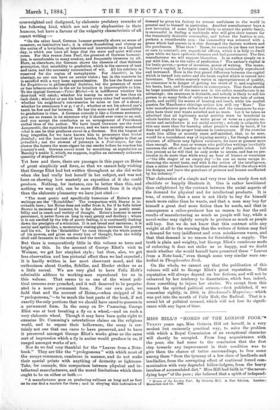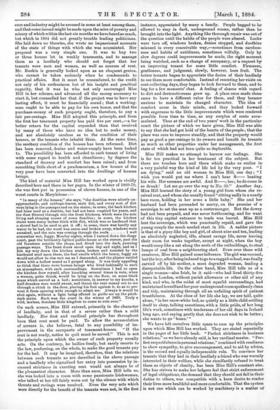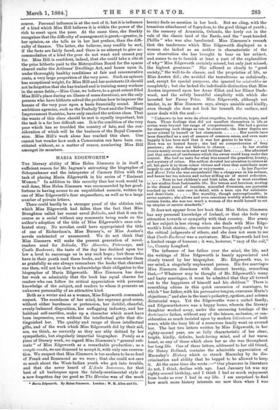MISS HILL'S "HOMES OF THE LONDON POOR."* TWENTY years ago,
Miss Octavia Hill set herself, in a very modest but eminently practical way, to solve the problem with which a Royal Commission of an exceptional character will shortly be occupied. From long acquaintance with the poor, she had come to the conclusion that the first step towards any improvement in their condition was to give them the chance of better surroundings, to free some among them "from the tyranny of a low class of landlords and landladies, from the corrupting effect of continual forced com- munication with very degraded fellow-lodgers, from the heavy incubus of accumulated dirt." Miss Hill had faith in " the never- dying hope" of the poor ; she believed that a spirit of independ-
• Homes of the London Poo.. By Octavio. H1. A. Now Ed.iioa. LondOd : lisemilian and Co. 1883.
en ce and industry might be aroused in some at least among them, and that some inroad might be made upon the mire of poverty and misery of which within the last six months we have beard so much, but which in 1864 did not greatly trouble leading politicians. She laid down no theories, she wrote no impassioned accounts of the state of things with which she was acquainted. Her proposal was a very simple one. It was to buy two or three houses let in weekly tenements, and to manage them as a landlady who should not forget that her tenants were men and women, as well as sources of rent.
Mr. Ruskin is generally looked upon as an eloquent genius, who cannot be taken seriously when he condescends to practical affairs. But it must be remembered, to the credit not only of his enthusiasm but of his insight and practical sagacity, that it was he who not only encouraged Miss Hill in her scheme, and advanced all the money necessary to start it, but counselled her that if the project was to have any lasting effect, it must be financially sound ; that a working.
man ought to be able to pay for his own house, and that the purchase-money of such property ought, therefore, to pay a fair per-centime. Miss Hill adopted this principle, and from the first her tenement property has paid five per cent.,—a far better return for the capital expended than that received by many of those who have no idea but to make money, and are absolutely careless as to the condition of their houses, or the tenants who inhabit them. At the same time, the sanitary condition of the houses has been reformed. Dirt has been removed, drains and water-supply have been looked to. The possibility has been afforded to each tenant of living with some regard to health and cleanliness ; by degrees the standard of decency and comfort has been raised ; and from something little short of a pandemonium, a few houses of the very poor have been converted into the dwellings of human beings.
The kind of material Miss Hill has worked upon is vividly described here and there in her pages. In the winter of 1869-70, she was first put in possession of eleven houses, in one of the worst courts in Marylebone :—
" In many of the houses," she says, "the dustbins were utterly un- approachable, and cabbage-leaves, stale fish, and every sort of dirt were lying in the passages and on the stairs; in some, the back kitchen had been used as a dustbin, but had not been emptied for years, and the dust filtered through into the front kitchens, which were the sole living and sleeping rooms of some families ; in some, the kitchen stairs were many inches thick with dirt, which was so hardened that a shovel had to be used to get it off ; in some, there was hardly any water to be had, the wood was eaten and broken away, windows were smashed, and the rain was coming through the roofs I well remember wet, foggy, Monday nights, when I turned down the dingy court, past the brilliantly-lighted public-house at the corner, past the old furniture outside the shops, and dived into the dark, yawning passage-ways. The front doors stood open day and night, and as I felt my way down the kitchen stairs, broken and rounded by the hardened mud upon them, the foul smells which the heavy, foggy air would not allow to rise met me as I descended, and the plaster rattled down with a hollow sound as I groped along. It was truly appalling to think that there were human beings who lived habitually iu such an atmosphere, with such surroundings. Sometimes I had to open the kitchen door myself, after knocking several times in vain; when a woman, quite drunk, would be lying on the floor, on some black mass which served as a bed ; sometimes, in answer to my knocks, a half.drunken man would swear, and thrust the rent-money out to me through a chink in the door, placing his foot against it, so as to pre- vent it from opening wide enough to admit me. Always it would be shut again, without a light being offered to guide me up the pitch. dark stairs. Such was the court in the winter of 1869. Truly a wild, lawless, desolate little kingdom to come to rule over."
On such scenes, Miss Hill entered, primarily in the character of landlady, and in that of a severe rather than a mild landlady. Her first and cardinal principle has throughout been that rent must be paid. To allow the accumulation of arrears is, she believes, fatal to any possibility of im- provement in the occupants of tenement-houses. "If the rent is not ready, notice to quit must be served." This is not the principle upon which the owner of such property usually acts. On the contrary, he bullies freely, but rarely resorts to the law, preferring, on the whole, to make the good tenants pay for the bad. It may be imagined, therefore, that the relations between such tenants as are described in the above passage and a landlady who signalised her entry into possession by in- creased strictness in exacting rent would not always be of the pleasantest character. More than once, Miss Hill tells us, she was locked into a room with some passionate Irishwoman, who talked at her till fairly worn out by the silence with which threats and ravings were received. Even the very acts which were directly for the benefit of the tenants were not, in the first
instance, appreciated by many a family. People begged to be. allowed to stay in dark, underground rooms, rather than be- brought into the light. Anything like thorough repair was out of the question until the habits of the people were altered. Locke were torn off, windows broken, drains stopped, and dustbins misused in every conceivable way,—sometimes from careless- ness and habits of untidiness, sometimes wilfully. Only by slow degrees could improvements be made, the right moment being watched, such as a change of occupancy, or a request by an improving tenant for some little comfort. Firmness,. gentleness, and judgment, slowly, however, bore fruit. The better tenants began to appreciate the desire of their landlady to see them more comfortable. Instead of resenting her visits on rent-collecting days, they began to look forward to them, and to. beg for a few moments' chat. A feeling of shame with regard. to dirt and destructiveness grew up. A place once made clean, came to have a different value for them, and they became. anxious to maintain its changed character. The idea of comfort arose in their minds, and they looked forward with eagerness to the little improvements which were rendered possible from time to time, as any surplus of rents accu- mulated. Thus at the end of two years' work in the particular- court the picture of which we have given, Miss Hill was able to say that she bad got hold of the hearts of the people ; that the place was sure to improve steadily, and that the property would pay as good a per-tentage to its owners and benefit its tenants- as much as other properties under her management, the first state of which had not been quite so deplorable.
Miss Hill makes no attempt to harrow our feelings. She- is far too practical in her treatment of the subject. But there are touches here and there which make us realise in' a very painful way the kind of life led by the very poor. "I am dying," said an old woman to Miss Hill, one day; "I wish you would put me where I can't hear 8-- beating his wife. Her screams are awful. And B—, too ; he do come in so drunk! Let me go over the way to No. 30." Another day,. Miss Hill learned the story of a young girl from whom she re- ceived rent, and whom she usually found " sitting sadly in a nearly bare room, holding in her arms a little baby." She and her husband had been persuaded to marry, on the promise of a sovereign to set the man up as a costermonger. Bat the dowry had not been prepaid, and was never forthcoming, and for want of this tiny capital entrance to trade was barred. Miss Hill lent the sovereign, which was punctually repaid, and gave the young couple the much needed start in life. A sadder picture- is that of a gipsy-like boy and girl, of about nine and ten, leading• an absolutely neglected, idle, almost savage life, never leaving. their room for weeks together, except at night, when the boy would creep like a cat along the roofs of the outbuildings, to steal, lumps of coal from a neighbouring shed. Even over these wild. creatures, Miss Hill gained some influence. The girl was rescued,. brit the boy, after being induced to go to a ragged-school, was finally carried off by his mother, a most degraded woman, leading a disreputable life. On the other hand, Miss Hill tells us of a single woman—also Irish, be it said—who had lived thirty-five years in London, without parish allowance or other aid of any kind, and who, in the midst of most squalid surroundings, had maintained herselfand her poor underground room spotlessly clean and tidy, maintaining through all an unfailing spirit of patient. trustfulness. At the close of her life she lay, we are told, quite alone, " in her snow-white bed, as quietly as a little child settling itself to sleep, talking sometimes, with a little pride, of her long life's work, sometimes with tenderness of her old days in Ireland long ago, and saying gently that she does not wish to be better; she wants to go home.' " We have left ourselves little space to sum up the principles upon which Miss Hill has worked. They are stated repeatedly in the pages of her little book. "Perfect strictness in business, relations," as we have already said, is her cardinal maxim. "Per- fect respectfulness in personal relations," combined with readiness. to show sympathy, to give encouragement, and to aid by advice,. is the second and equally indispensable rule. To convince her tenants that they had in their landlady a friend who was warmly interested in their welfare, while she steadfastly refused to treat them as objects of charity, has been Miss Hill's constant aim.. She has striven to make her lodgers feel that strict enforcement of legal obligations, the demand that they should not fail in their duties to others, was compatible with a keen desire to render their lives more healthful and more comfortable. That the system is not one which can be worked by machinery is a matter of course. Personal influence is at the root of it, but it is influence of a kind which Miss Hill believes it is within the power of the rich to exert upon the poor. At the same time, she frankly recognises that the difficulty of management is great,—greater, in her opinions as she tells us in her last preface, than the diffi- culty of finance. The latter, she believes, may readily be met, if the facts are fairly faced, and there is no attempt to give ac- commodation of a kind the poor do not want and cannot pay for. Miss Hill is confident, indeed, that she could take a site at the price hitherto paid to the Metropolitan Board for the spaces cleared under the Artisans' Dwellings Act, and house upon it, ender thoroughly healthy conditions at fair and remunerative rents, a very large proportion of the very poor. Such an opinion has exceptional weight, for Miss Hill and her assistants (it should not be forgotten that she has trained and is training many workers in the same fields,—Miss Cons, we believe, to a great extent filled Miss Hill's place during an illness of some duration), are the only persons who have hitherto solved the problem how to improve the houses of the very poor upon a basis financially sound. More ambitious agencies, such as the Peabody Trust and the Dwellings Improvement Societies, have only reached the artisan class. That the wants of this class should be met is equally important, but the task is a far less difficult one. It is the condition of the very poor which has so troubled the country of late, and the con- sideration of which will be the business of the Royal Commis- sion. Miss Hill's work alone has reached this class. One cannot but wonder how such a Commission can have been con- stituted without, as a matter of course, numbering Miss Hill amongst its members.




































 Previous page
Previous page